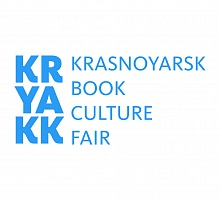31.10.2018
XII Krasnoyarsk Book Fair will be held in Krasnoyarsk from 1 to 5 November 2018.
The main theme of XII KRYAKK - FOURTH INDUSTRIAL REVOLUTION.
Each industrial revolution is a fateful event in world history, it is a fundamental shift not only in technology but also in all spheresof human activity - in the philosophical perception of the world, in politics, in labor economy, in culture, in collective and individual identity.
The first industrial revolution was connected to the appearance of a steam engine and marked the transition from manual labor to machine, which led to the assertion of capitalism, the growth of urbanization, the growth of living standards and education.
The second industrial revolution, marked by the introduction of electricity, also contributed to rapid economic growth and further changes in the humanitarian sphere. he development of telecommunication and energy technologies and systems at the end of the 20th century was a trigger for the third industrial revolution, made the world truly global, while simultaneously pointing out the problem of job cuts and time-wasting.
The fourth industrial revolution is a predictable process, involving the introduction of new technologies into mass production and automation of human needs. The consequences of the fourth industrial revolution are only a topic of the latest economic and socio-cultural research and conferences, but it is obvious that changes in society with the introduction of new technologies will be global. The industrial revolution, a breakthrough in technology always testifies first of all to the revolution in consciousness. The prerequisites found in culture, in public life of people, are no less important than the development of production. Utopias and anti-utopias, described by philosophers and thinkers, become reality, plots from fantastic literature turn into everyday practice of human existence.
The constant interchange of production and culture, of human thought and economic practice is a process that ensures the progressive renewal of the formal and content aspects of human life activity. How will our consciousness change, what will be the relations between man and the world of things, what skills and knowledge should a man of the era of the fourth industrial revolution have? Our experience of interaction with the latest technologies shows that they are already changing us: from forms of social interaction to everyday "tactile choreography."
Already today we can observe how new communication possibilities influence the structure of human communication, the notion of space and distances. Due to the Internet, the obvious link between the availability of work and the place of residence disappears, the growth of technology leads to an increase of free time, and hence to a new system of priorities in human employment.
Increasing the speed of global processes, hypercommission and at the same time a strong fragmentation of the world are a challenge and simultaneously an opportunity for a meaningful change in the future.
Today we live in a situation where the tradition is no longer working, and the new value system has not yet been worked out. Habitual hierarchies and oppositions (high - low, original - replicated, professional - amateurish, elitist - marginal) no longer describe the existing structure of society: there is an obvious demand for an actual model of the near future.
The same situation arises in the question of ethics: the moral principles of the past are confronted with the new status quo, not up to the test of time: new answers are needed to questions about what can and can not be done, how the institution of reputation functions today. In the new conditions of accessibility and storage of information, acts and statements from the past exist in the public consciousness on a par with the present, the notion of relevance is changing. Information transparency leads to the emergence of new writing and new creativity, creativity becomes accessible, art loses its elitism, the situation with copyright changes. The phenomenon of post-truth, based on emotions and beliefs more than facts, changes political strategies.
The post-work economy leads to the disappearance of a number of professions and to the emergence of new ones, to an increase in the creative component, to a different attitude to mass production and to exclusivity, to a different way of using resources. In the first place, not capital and the number of employees, but the originality of thinking and talent, the importance of meaningful participation in the labor process.
In conditions when the consciousness of people changes, the ways of their communication with each other, when the situation of uncertainty becomes constant, and the processes of globalization make new demands, the content of education and ways of its implementation alters as well. The teacher has lost the monopoly on the translation of knowledge, but he has not yet become an experienced assistant in their acquisition.
The school as an institution has to go through a complex path of transformation to find its place in the era of the fourth industrial revolution and to preserve its importance in the life of society.
A qualitative leap into the future leads to the flourishing of the phenomenon of nostalgia, social fears, the instability of the new culture makes humanity search for patterns in the retro sphere.
The challenges presented to mankind by the fourth industrial revolution, requiring formulation and detailed discussion, will become the main theme of the Krasnoyarsk Book Fair in 2018.
